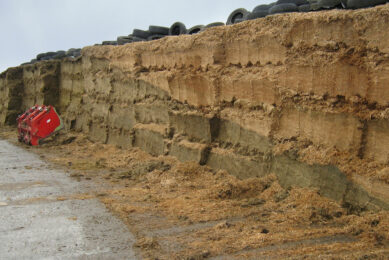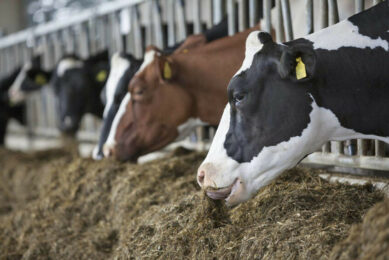How can bacteria-based direct-fed microbials support your herd?
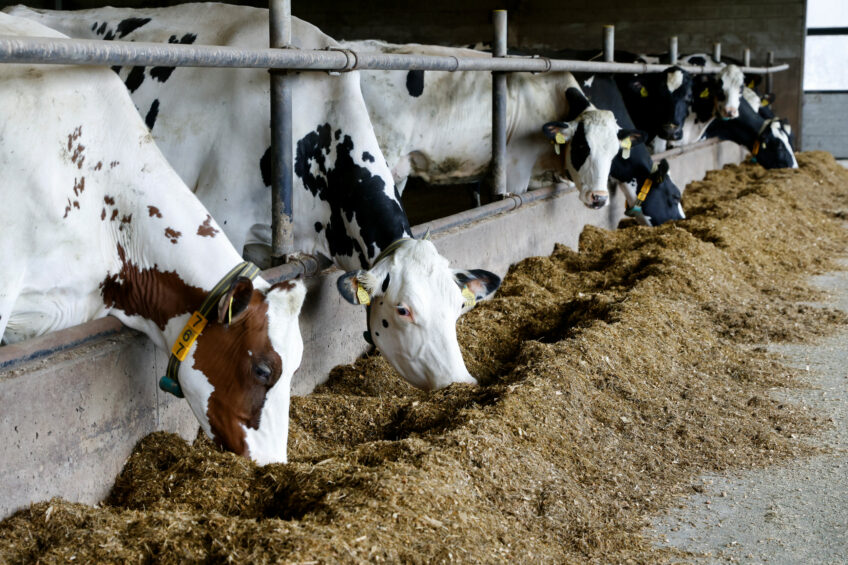
In previous articles, we’ve presented an overview of the power of good bacteria to our dairy herd, explaining the potential benefits and how good bacteria can support animal health on a daily basis. However, most of the information we’ve previously shared focused on general features under laboratory conditions. This helps us understand the basics of these beneficial microorganisms, but does not provide an entire health picture of our animals.
The main goal of this article is to demonstrate how a technology, such as direct-fed microbials (DFM), developed from nature, and a company with more than 100 years of biosolution experience, can impact your herd. In this article, we present some of the scientific data generated by Novonesis with dairy animals, including pre-weaning calves and lactating dairy cows.
Pre-weaning calves
Pre-weaning calves are one of the most, if not the most, important categories on a dairy farm, as they represent the genetic foundation of the future dairy herd. However, it is common to oversee this category and not give the calves the attention they deserve.
This scenario becomes even more critical when we think about all the challenges these animals face, including: (i) novel environment, (ii) presence and first-time contact with potentially harmful bacteria, viruses, and protozoa, including Escherichia coli, Salmonella spp., Rotavirus, Coronavirus, Clostridium spp., Cryptosporidium spp., and Eimeriia spp., (iii) personnel and handling, (iv) nutritional management, (v) sanitary management, and possibly others.
On top of that, newborn calves do not have a fully developed immune system, they need colostrum to provide protection in their first few days of life. So, several factors challenge a newborn and underdeveloped calf in a stage of life that, as demonstrated by other researchers, may have long-term effects on the productive life of the herd. In other words, calves that present adverse health events during the pre-weaning period will have an impaired growth rate during early life and also impaired milk production and composition in their first and subsequent lactations.
Given all that, we’ve recently conducted an experiment evaluating the effects of supplementing a Bacillus-based DFM alone or in combination with Enterococcus faecium on the health and growth rates of calves during a 77-day pre-weaning period. The DFM were offered daily via pasteurised whole milk prepared on the farm. The calves were monitored daily for signs of adverse health events (diarrhoea and pneumonia) and the body weight of the animals was measured at the beginning and at the end of the study (day 77).
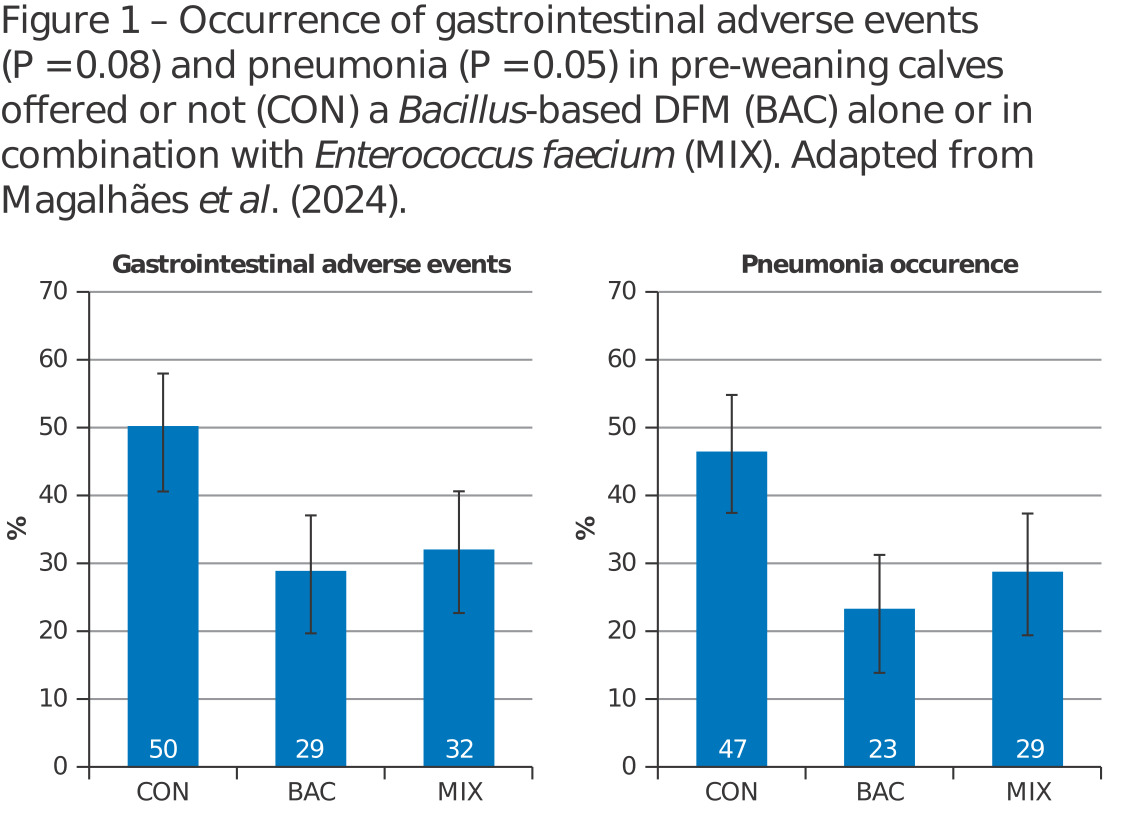 At weaning, calves given a DFM supplement were heavier (P = 0.04; +6.3 and +5.0 kg for Bacillus spp. only and for the combination of Bacillus and E. faecium, respectively) than the group which did not receive any supplements. Moreover, it was also observed that the likelihood of adverse gastrointestinal events and pneumonia was reduced by 56% and 61%, respectively, when calves were fed with a Bacillus-based DFM or the combination of Bacillus and E. faecium (Figure 1).
At weaning, calves given a DFM supplement were heavier (P = 0.04; +6.3 and +5.0 kg for Bacillus spp. only and for the combination of Bacillus and E. faecium, respectively) than the group which did not receive any supplements. Moreover, it was also observed that the likelihood of adverse gastrointestinal events and pneumonia was reduced by 56% and 61%, respectively, when calves were fed with a Bacillus-based DFM or the combination of Bacillus and E. faecium (Figure 1). These results support our statements that healthier animals will be more productive, and also substantiates the statement that the welfare status dictates the herd performance.
In another study, it was observed that feeding a combination of Lactobacillus animalis and Propionibacterium freudenreichii to Holstein bull calves improved the development of ileal cells during the pre-weaning period, and improved the development of the rumen in the post-weaning period (Dick et al., 2013). Altogether, a greater development of the cells in the gastrointestinal tract (GIT) lead to greater nutrient absorption, which positively impacts calf growth rate. But, once more, this can only be achieved because calves are healthier.
Lactating dairy cows
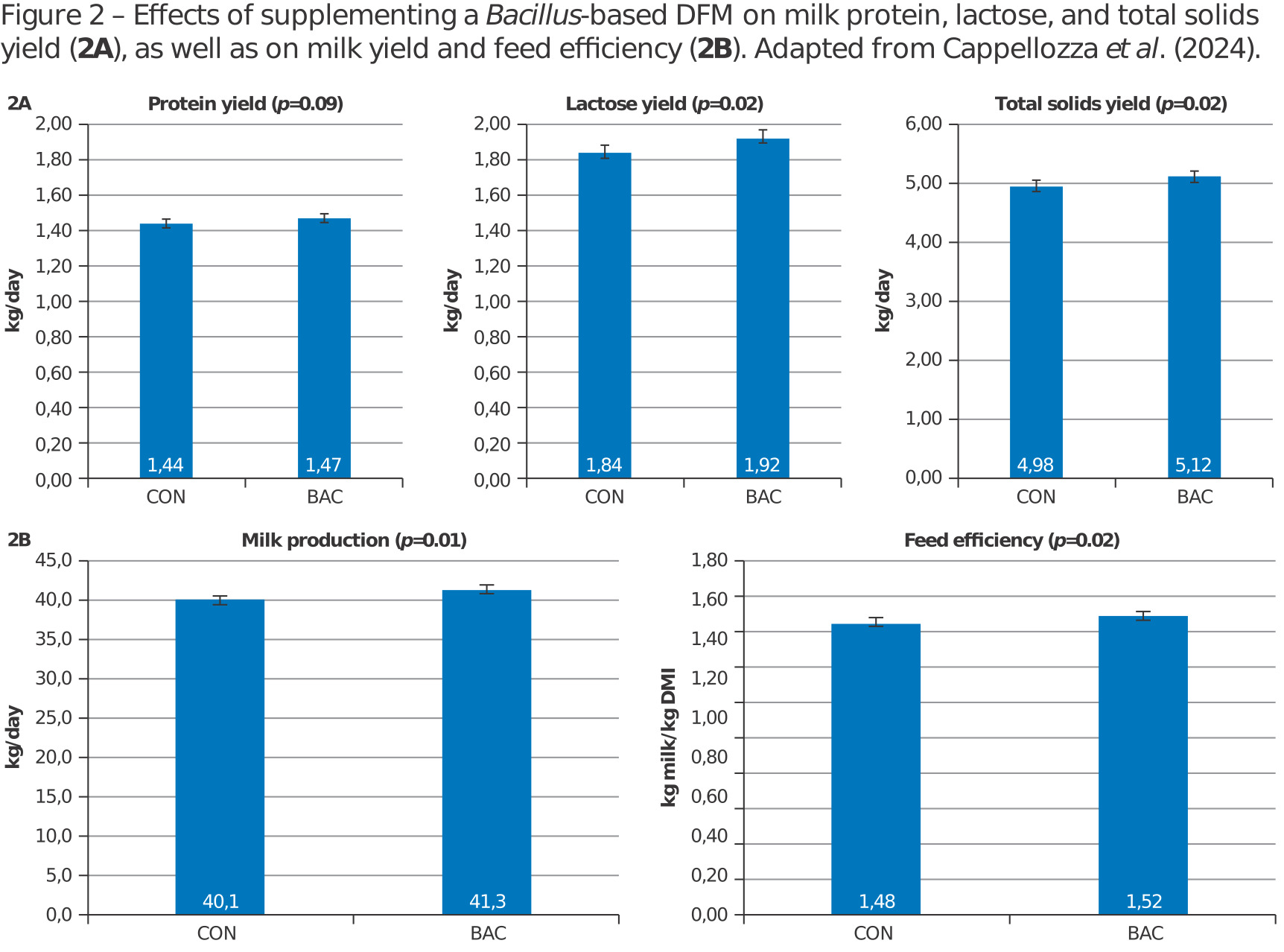 In lactating dairy cows that are past the periparturient period (> 3 weeks post-partum), it may become more challenging to detect adverse health events, especially when they are present subclinically. With this in mind, it makes good sense to consider preventive actions to optimise the health and performance of the entire herd.
In lactating dairy cows that are past the periparturient period (> 3 weeks post-partum), it may become more challenging to detect adverse health events, especially when they are present subclinically. With this in mind, it makes good sense to consider preventive actions to optimise the health and performance of the entire herd. In one study conducted in Sweden, we fed a Bacillus-based DFM in a pelleted supplement to lactating dairy cows (50 days post-partum) for 12 weeks.
We observed that cows fed the probiotic produced more milk containing more lactose and total solids (kg/day; Figure 2). Moreover, there was a positive influence on feed efficiency, measured as kg milk produced per kg of feed consumed, when feeding the DFM (Figure 2). For instance, greater feed efficiency, or producing more with fewer natural resources, is one of the factors recognised and associated with the sustainability and profitability of dairy farms all over the world.
Nutrient digestibility
Besides supporting health, Bacillus-based DFM produces enzymes that influence nutrient degradation and utilisation in the host. In a series of in vitro studies with rumen fluid from dairy cows, the positive effects of adding a Bacillus-based DFM on dry matter, fibre, starch degradation of forages, high-concentrate feeds, and lactating cow total mixed rations (TMR) were observed.
The effects observed in vitro may show us important benefits to the dairy cow, given that fibre digestibility is positively associated with feed intake and milk production.
In summary, we demonstrated how feeding good bacteria, or DFM, may support the health status of dairy calves, as well as growth rates and productive performance of lactating dairy cows. Stay tuned for further publications on how good bacteria can support your dairy operation.
References available on request.



